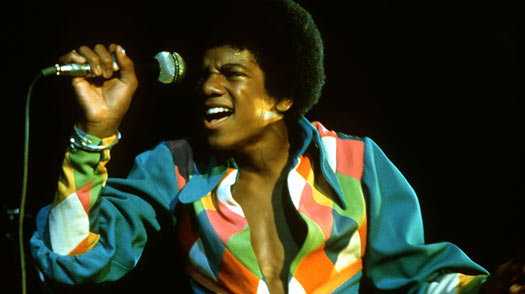
Michael Jackson performs in 1980.
(2 of 3)
Joe and Katherine sensed time was running short. Like countless stage parents before them, they understood that the moment to launch a child star is well before the hormones hit. As a family friend once said, "Katherine knew the only way out of Gary was through Michael ... One day she turned to me and said, 'Michael is cute now, but he won't stay that way forever. Then what do we do? They've got to get a record contract now.' "
This urgency wasn't lost on Michael, who had a grown man's sense of commerce behind his big brown eyes and cherub cheeks. Impatient, Joe took his boys to record a single at tiny Steeltown Records in Gary. Ben Brown, the label's president, recalled that the youngster was unhappy at the subsequent photo session. "Michael said the setup looked like a family portrait," Brown once told an interviewer. "He said, 'Isn't this supposed to be business?' So he set up the group the way he thought it should be and took his pose at the front, and that's the picture we used. He had some savvy. He knew even from then."
Gordy finally agreed to see the Jacksons the following year, 1968. The Motown mogul listened with a poker face to an entire set. Inside, Gordy later said, he was thinking that Michael's superhuman dancing was too mature for his piping voice, and he would need a brand of music written just for him. "We could not believe this old man in this young kid's body," said Gordy. When the music stopped, he handed Joe a contract, the brothers bounced with joy, then stepped onto Motown's conveyor belt to stardom. And what was that like? Wall-to-wall work. The house songwriters started cranking out "soul-bubblegum," as Gordy called it. The arrangers and producers and sidemen pushed the boys in search of a Jackson 5 sound. There were endless hours with the Motown fashion crew, trying on wild clothes, and more hours with the hair stylists, and still more hours with Gordy's etiquette teachers. Inside the studio, there was a name for the group handling the Jacksons: "the Corporation."
After a year in the Corporation's factory, the Jackson 5 were a finished product, released to the public with a single called "I Want You Back." The brothers traded snippets over a percolating bass and percussion line, but it was Michael's song; he owned it from the moment he soared thrillingly on a glissando to plead "Ooooh, ba-by, give me one more chance." And with that, he was forever stamped on the world's sound track. The song hit No. 1 in January 1970. Their next recording, "ABC," reached No. 1 in April — bumping "Let It Be," by a group called the Beatles. "The Love You Save" topped the charts in June, followed by "I'll Be There" in October. Of all the great Motown acts, the Jackson 5 were the first to chart four No. 1 hits in a single year. Sometimes lost in the dazzle of their debut is the fact that with "I'll Be There," Michael Jackson gave birth to a classic ballad at the age of 12. Not even Judy Garland managed that.
The price of success, as it was for Garland and other prodigies, was a lost childhood. "There was a park across the street from the Motown studio, and I can remember looking at those kids playing games," Jackson wrote in his memoir, Moon Walk. "I'd just stare at them in wonder — I couldn't imagine such freedom, such a carefree life — and I wish more than anything I had that kind of freedom, that I could walk away and be just like them."